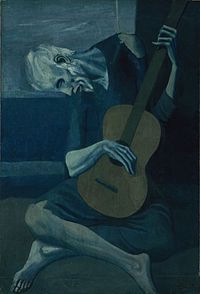
In "Scenes of America," describing a post-Katrina resolve, Walter Isaacson explodes the imagination and deftly brings logic to a chaos of emotions that New Orleans has always triggered for me by using a word (perhaps best recognized as the title of Lillian Hellman's autobiography): pentimento.
Pentimento refers to the reappearance in painting of an underlying image that has been painted over. For me, my first experience with this effect was on a field trip to the Art Institute of Chicago and on first seeing Pablo Picasso's The Old Guitarist. Far more powerful for me than the slightly deformed looking man was the mysterious image of a woman painted underneath. I always placed more faith in the artist's intent as being more than simply recycling a cheap panel ... her haunting eyes visible just above the line formed by the guitarist's arthritic neck gave power and rebirth to this bent man. The new and transcendent was in fact the old and transitorily covered. Like The Old Guitarist, in Issacson's passion, New Orleans is our cultural pentimento where rich and textured will never be covered by safe and homogeneity. In remaking itself, New Orleans is as it was and never will be.
I think this dualism of never and always is best described in one of my favorite poems. There is no doubt Wallace Stevens was ruminating on Picasso when he wrote "Man with the Blue Guitar." Here is the opening stanza which in many ways is why I see the work I do in communities to encourage them to work differently -- not unlike New Orleans -- as "my blue guitar!"
The Man With the Blue Guitar
Wallace Stevens
The man bent over his guitar,
A shearsman of sorts. The day was green.
They said, “You have a blue guitar,
You do not play things as they are.”
The man replied, “Things as they are
Are changed upon the blue guitar.”
And they said to him, “But play, you must,
A tune beyond us, yet ourselves...,
Pentimento refers to the reappearance in painting of an underlying image that has been painted over. For me, my first experience with this effect was on a field trip to the Art Institute of Chicago and on first seeing Pablo Picasso's The Old Guitarist. Far more powerful for me than the slightly deformed looking man was the mysterious image of a woman painted underneath. I always placed more faith in the artist's intent as being more than simply recycling a cheap panel ... her haunting eyes visible just above the line formed by the guitarist's arthritic neck gave power and rebirth to this bent man. The new and transcendent was in fact the old and transitorily covered. Like The Old Guitarist, in Issacson's passion, New Orleans is our cultural pentimento where rich and textured will never be covered by safe and homogeneity. In remaking itself, New Orleans is as it was and never will be.
I think this dualism of never and always is best described in one of my favorite poems. There is no doubt Wallace Stevens was ruminating on Picasso when he wrote "Man with the Blue Guitar." Here is the opening stanza which in many ways is why I see the work I do in communities to encourage them to work differently -- not unlike New Orleans -- as "my blue guitar!"
The Man With the Blue Guitar
Wallace Stevens
The man bent over his guitar,
A shearsman of sorts. The day was green.
They said, “You have a blue guitar,
You do not play things as they are.”
The man replied, “Things as they are
Are changed upon the blue guitar.”
And they said to him, “But play, you must,
A tune beyond us, yet ourselves...,
To be tweeted links to my new posts -- blog, book reviews (both nonfiction and fiction), data or other recommended tools -- either go to Twitter.com and follow me @jcrubicon, or just go to my Home page and click on the Twitter button on the right, just above the tweet stream, and follow me @jcrubicon.
 RSS Feed
RSS Feed
